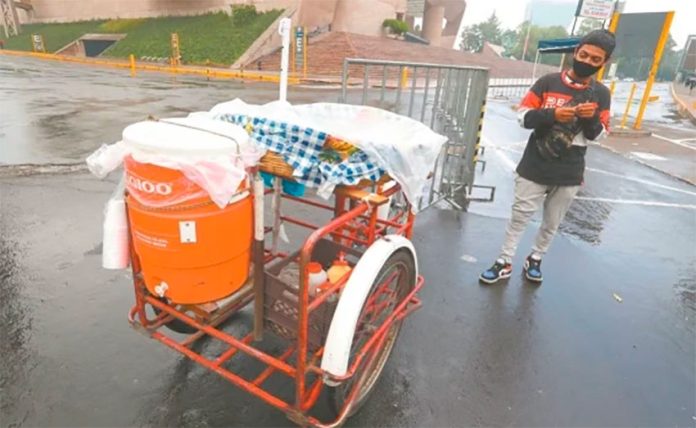Tricycle vendors in Mexico City’s Miguel Hidalgo municipality say they have to pay three different bribes totaling 700 pesos (about US $32) a week to peddle their wares. Sometimes the total represents more than half their income.
Before the coronavirus pandemic, tricycle vendors say, they earned up to 1,500 pesos a week. Now they are lucky to take in 1,000 and the bribes have further crippled their incomes.
Coffee sellers Omar and Federico say that each week they have to pay municipal authorities 100 to 200 pesos in order to operate on the municipality’s streets, and the amount fluctuates depending on the products the sellers offer.
“You must give people from the [mayor’s office] a fee to let you sell,” Omar told the newspaper El Universal while attending to customers near the Metro Auditorio subway station. “That fee is mandatory. If it’s not paid, they won’t let you work.”
Those who sell in the tony Polanco area also pay police 50 pesos a day for the privilege of setting up shop there.
Hegel Cortés Miranda of the Miguel Hidalgo mayor’s office said the government is aware of the allegations of such payments but no one has made a formal complaint.
But there’s another fee that speaks to the growing rumors of nefarious forces controlling wheeled trade in the city.
Vendors say they are also being charged 500 pesos a week by unidentified individuals in exchange for protection from government inspectors. They refuse to name those involved for fear of reprisals.
On August 15, Miguel Hidalgo officials announced that they had confiscated 140 tricycles, for which several reasons were given. One was the coronavirus, another was that the city had received more than 3,000 complaints, and still another was that the seizure represented an attempt to break up a tricycle mafia on the city’s streets.
“These are not ordinary people who dedicate themselves to this, but there is a whole tricycle industry,” Miguel Hidalgo Mayor Victor Hugo Romo said. “I can say that in some cases it is a mafia, there are honorable exceptions, but the ones that we have removed are in a union, like an industry, (under the command) of two people who hoard their tricycles and invade public space without permission,” he explained in an interview on Monday.
Those individuals, who Romo says have been identified, control tricycles across the municipality and reap huge profits. “For 500 carts they take in 2 million pesos (US $90,578) a day,” the mayor said in a recent interview.
Although Romo’s office first said it would destroy the tricycles, it later recanted and said they would be returned to their owners provided they have a receipt, and those that are not claimed would be donated to charities such as Bicitekas, which provides healthcare personnel with bicycles.
As of yesterday, 35 tricycles had been reclaimed.
Source: El Universal (sp), La Silla Rota (sp), Milenio (sp), W Radio (sp)
